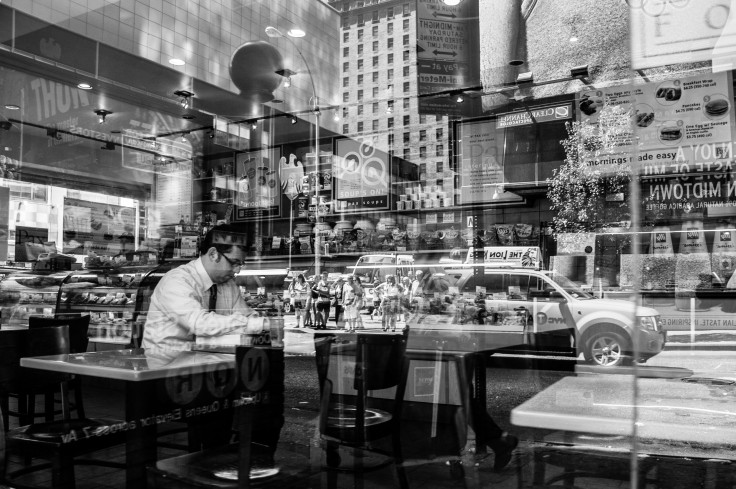Solo Dinner Reservations Are On The Rise, And It May Be Best For Diners' Health

Making a dinner reservation for one may be the healthiest choice a diner can make. If you're worried you'll be judged for eating alone, don't be: Over the last two years, online reservation service table OpenTable has seen a 62 percent increase in tables for one throughout America.
"Solo diners are taking every opportunity to visit top restaurants whenever they get the opportunity," said Caroline Potter, a chief dining officer and spokeswoman at OpenTable, in a statement. "Solo dining is about treating yourself to a delicious experience and savoring every bite. From communal and counter seating to doting table service, restaurants are welcoming parties of one with open arms."
Out of all 50 states, New Yorkers rank fourth on the cities with the greatest increase in lone diners, with Philadelphia, Las Vegas, and Chicago diners trailing behind. Meanwhile, Dallas, Miami, and Denver are the top three cities with the greatest growth in dinner reservations for one.
A healthier dining experience?
The lead esearcher at Cornell Food Brand Lab Brian Wansink describes a previous study in his book, Mindless Eating:Why We Eat More Than We Think, that was designed to test for the possible health benefits of eating alone. Researchers set up a series of lunches with pizza, cookies, and soda for a group of random participants. First, participants were asked to eat alone as they were being observed, and their food was weighed and measured by on-looking scientists. On a separate occasion, those same participants were giving the same lunch, but placed in groups of four or eight other people.
When participants were eating alone, they either ate very little or a significant amount of food. But when they were placed in groups, the light eaters ate more and the heavy eaters ate less; Wansink calls this “the power of norms.” So for example, if you normally eat one slice of pizza, but the group you're with eats more than one slice, then this power suggests you’re more likely to nibble on a second slice. And if you normally eat a few slices pizza alone, then you might eat a couple slices less when eating in a group.
People compare their eating habits to others, and tend to even mimic not only how much they eat, but also the speed at which they eat. In every group of diners, whether it’s a couple out on a date or a dinner party of twelve, Wansink said that each diner with and near you can become an undercover pacesetter. Wansink explained that the pacesetter subtly suggests to their unsuspecting dining partner the amount and speed that’s appropriate to eat. This, again, suggests heavy eaters may eat better with a group, whereas light eaters may eat best when they're alone.
Yet, no matter what kind of eater you are, seeking solitude over a plate of pasta is beneficial for the mind. According to psychologist Dr. Sherrie Bourg Carter, being alone gives the brain a chance to “reboot,” or rest and replenish itself. There are less distractions, which gives you the chance to clear your mind, focus, and think more clearly (provided you put your phone on silent).
“If you regularly go out to lunch, don't think that it always has to be with others,” Boug Carter told PsychologyToday. “Once a week or even just a couple of times a month, commit to spending lunch with yourself. Walk. Sit in the sun outside. Go to a park and eat. Enjoy the time you have alone.”
Source: OpenTable, Inc. 2015.



























